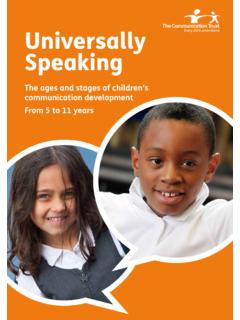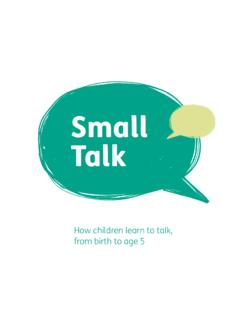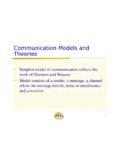Transcription of Universally Speaking - The Communication Trust
1 Universally Speaking The ages and stages of children's Communication development From birth to 5 years The Communication Trust The Communication Trust is a coalition of 50 voluntary and community organisations with expertise in speech, language and Communication . We harness our collective expertise to enable the children's workforce and commissioners to support all children and young people's Communication skills, particularly those with speech, language and Communication needs (SLCN). We do this by raising awareness, providing information and workforce development opportunities, influencing policy, promoting best practice among the children's workforce and commissioning work from our members. The Trust was founded in 2007 by Afasic, BT, Council for Disabled Children and I CAN. Pearson Assessment This booklet, along with the rest of the suite of the Universally Speaking booklets, was originally produced with the support of Pearson Assessment.
2 They are publishers of standardised assessments for a range of speech, language and Communication needs. Universally Speaking is a series of 3 booklets for anyone who works with children and young people. To order further copies of the Universally Speaking booklets please go to Contents Contents Children can all be great communicators 4. 5 top reasons to understand more about Communication 5. By six 6. By one 8. By 18 10. By two 12. By three 14. By four years 16. By five 18. Other information: EAL and a word about boys 20. Children with SLCN 21. Find out more 22. Frequently asked questions 23. Universally Speaking Age 0-5 3. Children can all be great communicators Communication is the way we Children's Communication The Early Years connect with other people. Foundation stage (EYFS) and language is everybody's It underpins learning and in England business'.
3 Parents and staff development in children of who see and work with children all ages and is a skill that can One of the prime areas of regularly are often the experts always be developed learning in the EYFS curriculum in knowing about a child's and improved. in England is Communication Communication . With the right and Language'. Within information and access to the Learning a language is the most Communication and Language right help at the right time early important thing a child will ever the three early learning goals on, everyone can really make a do. Young babies and children are based around; listening and difference. need to learn how to: attention', understanding' and NB Every effort has been made to Speaking '. The focus on these align the content of this booklet with Understand what people are areas shows how important descriptions of ages and stages in the saying it is that children develop Early Years Foundation stage (EYFS), good foundation skills in Development Matters, Every Child a Use words and sentences Communication and language Talker and Healthy Child Programme properly early on in their life.
4 Guidance. Speak clearly Universally Speaking provides information that will help you Look, listen and take turns to support children to develop skills in line with their age, as well as help you to identify and People sometimes assume support children who may be that speech, language and struggling. Communication skills develop and flourish no matter what. This is not the children need adults to encourage and support development of their language and Communication . 4 Universally Speaking Age 0-5. 5 top reasons to understand more about Communication It doesn't happen by accident! 1. Children need adults to nurture and support their Communication and language development. The more all people know and understand about language and how it develops, the better position they are in to help. You can make the difference 2 Early years practitioners are in a unique position to support the development of Communication and language skills in babies, toddlers and young children.
5 5 Supporting Communication development is easy when you know how. With Communication and language at the forefront of your mind, you can support development of these skills during everyday activities. 5 Quality early years settings and quality interaction with children can have a big impact on their Communication and language development. 5 You can share information with parents about the development of these skills. 3. It helps to know what happens and when Many practitioners report that they are not confident in knowing what children should be doing at different ages and stages, how to support good language skills and how to spot those children who might be struggling. The information in this booklet may help to spot and support children who are struggling. 4. Being able to talk and listen well is important At home, in the early years, at school and throughout life, language is vital in order to learn, make friends and feel confident.
6 Poor language puts children at risk of poor reading and writing, poor behaviour, poor exam results and a lack of success in school. 5. The earlier we help the better Lots of children struggle to develop their Communication skills. About 1 million children in the UK will have long term difficulties and in areas of social deprivation more than 50% of children start school with delayed language. Although there is some variation in the rate of learning to talk, there are key milestones for what children should be doing at different ages. It's important for practitioners to know what to expect, so they can check whether children are on the right track and identify those who might be struggling. Universally Speaking Age 0-5 5. By six Babies communicate from day one. As they By six months, babies will usually: develop, they begin to watch the adults around them and start making noises.
7 They 5 make sounds, like cooing, gurgling and will communicate with adults by watching babbling, to themselves and with other their faces and usually try to copy what they people do. Being able to copy is important for young 5 make noises to get your attention babies it is how they learn. 5 watch your face when you talk to them 5 get excited when they hear voices coming, showing their excitement by kicking or waving their arms or making noises 5 smile and laugh when other people smile and laugh 5 make sounds back when talked to 6 Universally Speaking Age 0-5. How to check it By six babies are amazing! Check out how the baby Check out how the baby Check out how the baby can communicate can listen can take part Copy sounds the baby makes. Talk to babies about what is Spend time talking and playing happening. get down on the floor with 5 Can they look at you and babies and play.
8 Sometimes join in? 5 Are they watching your face while you are talking? 5 Do they enjoy the company 5 Are they cooing and gurgling of adults? to themselves? 5 Do the babies smile and laugh with you? Some lovely things to do to encourage baby talk: 5 Get close, let them see your they are listening and taking it 5 Sing songs and rhymes. face, get right down to their all in. 5 Play peek-a-boo' or similar level, even lying down to make 5 Listen to them. Leave little games. eye contact, talk in a sing song spaces in your talk for the voice babies respond really well 5 Look at and talk about picture baby to join in or start the to this. books it's never too early to conversation' ask them share books. 5 Talk to babies in your care questions, tell them what you tell them what is happening and see - you may get a gurgle for an what you notice about them - answer.
9 If you are worried that a baby in your care is not doing these things there is more information on Or, using your setting's procedure, talk to the parents about your concerns. Universally Speaking Age 0-5 7. By one Babies communicate in more ways now By one year, babies will usually: making noises, pointing and looking to get your attention. They start to understand 5 make talking noises - babble strings of routines, simple words and activities. sounds, like ma-ma-ma', ba-ba-ba' point and look at you to get your attention 5 many, though not all 1 year olds, will be saying their first words and they may also use gestures 5 start to understand words like bye-bye' and up' especially when a gesture is used at the same time 5 recognise the names of familiar objects, things like cup' and bowl', teddy' and mummy'. 5 look at you when you speak or when they hear their name called 5 take turns in conversations', babbling back to an adult 8 Universally Speaking Age 0-5.
10 How to check it By one babies are amazing! Check out how the baby Check out how the baby Check out how the baby can talk can listen can take part Spend some individual time Talk about everyday activities, Spend time with babies in your with the babies in your care. like getting dressed, eating care, playing and talking. Talk and bathing. to the baby and leave a space 5 Do they try and get your for them to answer back. attention? If they want 5 Does the baby respond to something they can not reach things you say a lot? You 5 Do they make talking noises will they shout, point or make say arms up when you are and join in the conversation'? noises? (Naming the object that taking off a jumper and the 5 Wait for them to make a they request will help the baby baby puts their arms up. sound or do something, then to use the word in the future).










